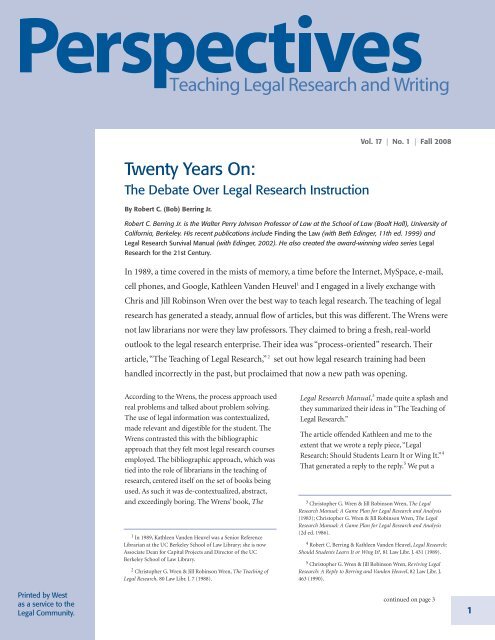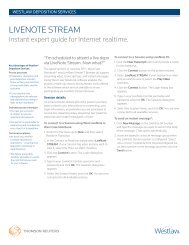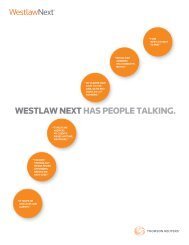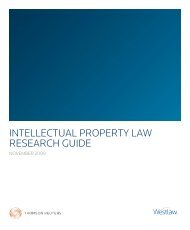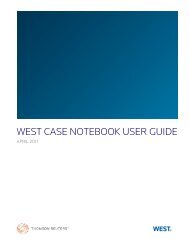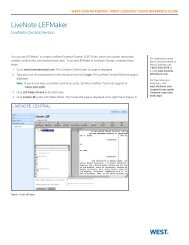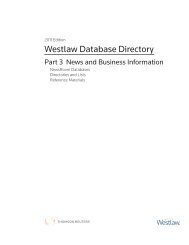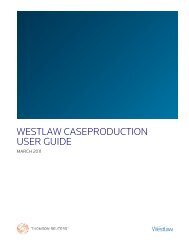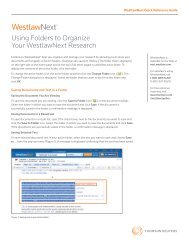Twenty Years On: The Debate Over Legal Research - West - Westlaw
Twenty Years On: The Debate Over Legal Research - West - Westlaw
Twenty Years On: The Debate Over Legal Research - West - Westlaw
You also want an ePaper? Increase the reach of your titles
YUMPU automatically turns print PDFs into web optimized ePapers that Google loves.
Printed by <strong>West</strong><br />
as a service to the<br />
<strong>Legal</strong> Community.<br />
<strong>Twenty</strong> <strong>Years</strong> <strong>On</strong>:<br />
<strong>The</strong> <strong>Debate</strong> <strong>Over</strong> <strong>Legal</strong> <strong>Research</strong> Instruction<br />
By Robert C. (Bob) Berring Jr.<br />
Robert C. Berring Jr. is the Walter Perry Johnson Professor of Law at the School of Law (Boalt Hall), University of<br />
California, Berkeley. His recent publications include Finding the Law (with Beth Edinger, 11th ed. 1999) and<br />
<strong>Legal</strong> <strong>Research</strong> Survival Manual (with Edinger, 2002). He also created the award-winning video series <strong>Legal</strong><br />
<strong>Research</strong> for the 21st Century.<br />
In 1989, a time covered in the mists of memory, a time before the Internet, MySpace, e-mail,<br />
cell phones, and Google, Kathleen Vanden Heuvel 1 and I engaged in a lively exchange with<br />
Chris and Jill Robinson Wren over the best way to teach legal research. <strong>The</strong> teaching of legal<br />
research has generated a steady, annual flow of articles, but this was different. <strong>The</strong> Wrens were<br />
not law librarians nor were they law professors. <strong>The</strong>y claimed to bring a fresh, real-world<br />
outlook to the legal research enterprise. <strong>The</strong>ir idea was “process-oriented” research. <strong>The</strong>ir<br />
article, “<strong>The</strong> Teaching of <strong>Legal</strong> <strong>Research</strong>,” 2 set out how legal research training had been<br />
handled incorrectly in the past, but proclaimed that now a new path was opening.<br />
According to the Wrens, the process approach used<br />
real problems and talked about problem solving.<br />
<strong>The</strong> use of legal information was contextualized,<br />
made relevant and digestible for the student. <strong>The</strong><br />
Wrens contrasted this with the bibliographic<br />
approach that they felt most legal research courses<br />
employed. <strong>The</strong> bibliographic approach, which was<br />
tied into the role of librarians in the teaching of<br />
research, centered itself on the set of books being<br />
used. As such it was de-contextualized, abstract,<br />
and exceedingly boring. <strong>The</strong> Wrens’ book, <strong>The</strong><br />
1 In 1989, Kathleen Vanden Heuvel was a Senior Reference<br />
Librarian at the UC Berkeley School of Law Library; she is now<br />
Associate Dean for Capital Projects and Director of the UC<br />
Berkeley School of Law Library.<br />
2 Christopher G. Wren & Jill Robinson Wren, <strong>The</strong> Teaching of<br />
<strong>Legal</strong> <strong>Research</strong>, 80 Law Libr. J. 7 (1988).<br />
Vol. 17 | No. 1 | Fall 2008<br />
<strong>Legal</strong> <strong>Research</strong> Manual, 3 made quite a splash and<br />
they summarized their ideas in “<strong>The</strong> Teaching of<br />
<strong>Legal</strong> <strong>Research</strong>.”<br />
<strong>The</strong> article offended Kathleen and me to the<br />
extent that we wrote a reply piece, “<strong>Legal</strong><br />
<strong>Research</strong>: Should Students Learn It or Wing It.” 4<br />
That generated a reply to the reply. 5 We put a<br />
3 Christopher G. Wren & Jill Robinson Wren, <strong>The</strong> <strong>Legal</strong><br />
<strong>Research</strong> Manual: A Game Plan for <strong>Legal</strong> <strong>Research</strong> and Analysis<br />
(1983); Christopher G. Wren & Jill Robinson Wren, <strong>The</strong> <strong>Legal</strong><br />
<strong>Research</strong> Manual: A Game Plan for <strong>Legal</strong> <strong>Research</strong> and Analysis<br />
(2d ed. 1986).<br />
4 Robert C. Berring & Kathleen Vanden Heuvel, <strong>Legal</strong> <strong>Research</strong>:<br />
Should Students Learn It or Wing It?, 81 Law Libr. J. 431 (1989).<br />
5 Christopher G. Wren & Jill Robinson Wren, Reviving <strong>Legal</strong><br />
<strong>Research</strong>: A Reply to Berring and Vanden Heuvel, 82 Law Libr. J.<br />
463 (1990).<br />
continued on page 3<br />
1
2<br />
In This Issue<br />
1 <strong>Twenty</strong> <strong>Years</strong> <strong>On</strong>: <strong>The</strong> <strong>Debate</strong> <strong>Over</strong> <strong>Legal</strong><br />
<strong>Research</strong> Instruction<br />
Robert C. (Bob) Berring Jr.<br />
5 In Memoriam: Roy M. Mersky<br />
<strong>Research</strong> Matters …<br />
6 <strong>Legal</strong> <strong>Research</strong> Readings to Inspire and Inform Students<br />
Shawn G. Nevers<br />
Brutal Choices in Curricular Design …<br />
11 Putting the Puzzle Together: Choices to Make When<br />
Creating a Closed-Universe Memorandum Assignment<br />
Judith Rosenbaum<br />
25 <strong>The</strong> “Grammar Bee”—<strong>On</strong>e Way to Take the Pain Out<br />
of Teaching the Mechanics of Writing<br />
Edward H. Telfeyan<br />
31 Teaching Practical Procedure in the <strong>Legal</strong> Writing<br />
Classroom<br />
Stephen E. Smith<br />
35 <strong>The</strong> Art of the Writing Conference: Letting Students Set<br />
the Agenda Without Ceding Control<br />
Christy DeSanctis and Kristen Murray<br />
Teachable Moments …<br />
41 Library Lifesavers: Bite-Sized <strong>Research</strong> Instruction<br />
Ann Hemmens<br />
Writing Tips …<br />
43 Understanding “Style” in <strong>Legal</strong> Writing<br />
Stephen V. Armstrong and Timothy P. Terrell<br />
48 <strong>Legal</strong> <strong>Research</strong> and Writing Resources: Recent Publications<br />
Barbara Bintliff<br />
54 Index to Perspectives: Teaching <strong>Legal</strong> <strong>Research</strong> and<br />
Writing, Volumes 1–16 (1992–2008)<br />
Mary A. Hotchkiss<br />
Perspectives: Teaching <strong>Legal</strong> <strong>Research</strong> and Writing | Vol. 17 | No. 1 | Fall 2008<br />
Perspectives: Teaching <strong>Legal</strong> <strong>Research</strong> and Writing<br />
is published in the fall, winter, and spring of each<br />
year by <strong>West</strong>.<br />
Editor<br />
Mary A. Hotchkiss<br />
University of Washington School of Law<br />
and the Information School<br />
Seattle, Washington<br />
Editorial Board<br />
Barbara A. Bintliff<br />
University of Colorado<br />
School of Law Library<br />
Boulder, Colorado<br />
Elizabeth Edinger<br />
Catholic University of<br />
America Law Library<br />
Washington, D.C.<br />
Penny A. Hazelton<br />
University of Washington<br />
School of Law Library<br />
Seattle, Washington<br />
Judith Meadows<br />
State Law Library<br />
of Montana<br />
Helena, Montana<br />
Kathryn S. Mercer<br />
Case <strong>West</strong>ern Reserve<br />
University School of Law<br />
Cleveland, Ohio<br />
Helene S. Shapo<br />
Northwestern University<br />
School of Law<br />
Chicago, Illinois<br />
Craig T. Smith<br />
Vanderbilt University<br />
Law School<br />
Nashville, Tennessee<br />
Kay Todd<br />
Paul Hastings Janofsky<br />
& Walker<br />
Atlanta, Georgia<br />
Opinions expressed in this publication are those of the<br />
authors and should not be attributed to the Editor, the<br />
Editorial Board, or <strong>West</strong>.<br />
Authors are encouraged to submit brief articles on<br />
subjects relevant to the teaching of legal research and<br />
writing. <strong>The</strong> Perspectives Author’s Guide and Style<br />
Sheet are posted at west.thomson.com/signup/newsletters<br />
/perspectives/perstyle.aspx. Manuscripts, comments,<br />
and correspondence should be sent to:<br />
Mary A. Hotchkiss, William H. Gates Hall, Box 353020,<br />
Seattle, WA, 98195-3020. Phone: 206-616-9333<br />
Fax: 206-543-5671 E-mail: hotchma@u.washington.edu<br />
To subscribe to Perspectives, use the card inside this<br />
issue, access west.thomson.com/signup/newsletters<br />
/perspectives, or contact:<br />
Ann Laughlin, <strong>West</strong>, Customer and Product<br />
Documentation, D5-S238, 610 Opperman Drive,<br />
Eagan, MN 55123. Phone: 651-687-5349<br />
E-mail: ann.laughlin@thomsonreuters.com<br />
west.thomson.com/signup/newsletters<br />
/perspectives<br />
Printed by <strong>West</strong> as a service to the<br />
<strong>Legal</strong> Community.
continued from page 1<br />
stopper in the bottle by replying to the reply to<br />
the reply with a short end note. 6 <strong>The</strong> tone of the<br />
articles carried a passion seldom seen in the pages<br />
of Law Library Journal, the professional journal<br />
of the American Association of Law Libraries.<br />
Because of that passion and because the Wrens’<br />
article appeared to view law librarians as a big part<br />
of the problem with the teaching of legal research,<br />
this issue sparked a good bit of interest. Remember<br />
this all happened before blogs and social networks<br />
kept hot issues moving in and out of view. Interest<br />
built, and it was strong enough that a debate was<br />
scheduled at the AALL Convention that year. 7 For<br />
a few months there was quite a bit of electricity in<br />
the air.<br />
Almost 20 years later one might wonder what the<br />
fuss was all about. In hindsight the Wrens espoused<br />
a more important role for legal research training<br />
and they felt that it was best done in an<br />
environment where the student was learning how<br />
to use the research tools. That is not a very<br />
controversial proposition. I doubt that we could<br />
find anyone who would advocate the old “roll a<br />
book truck into the classroom and just describe<br />
each book” school of pedagogy. (That assumes that<br />
the modern law student would know what a book<br />
truck was.) But the Wrens constructed a straw man<br />
that consisted of the worst practices in teaching<br />
legal research, and laid this sad product at the feet<br />
of law librarians.<br />
What the Wrens did not understand was that many<br />
librarians were fighting for better research training.<br />
<strong>Legal</strong> research training was terrible at many law<br />
schools, but that was not the fault of the law<br />
6 Robert C. Berring & Kathleen Vanden Heuvel, <strong>Legal</strong> <strong>Research</strong>:<br />
A Final Response, 82 Law Libr. J. 495 (1990).<br />
7 A <strong>Debate</strong> on the Methodology of Teaching <strong>Legal</strong> <strong>Research</strong>,<br />
a program presented at the 83rd Annual Meeting of the American<br />
Association of Law Libraries, Minneapolis (June 19, 1990) (speakers<br />
were Robert C. Berring and Christopher G. Wren; moderator was<br />
Steven M. Barkan). Christopher Wren had spoken at an earlier<br />
AALL meeting: Teaching <strong>Research</strong> Skills: How Successful Are We?,<br />
a program presented at the 79th Annual Meeting of the American<br />
Association of Law Libraries, Washington, D.C. (July 7, 1986)<br />
(audiotape available from Mobiltape Co.) (speakers were Patricia A.<br />
Wyatt, Christopher G. Wren, and Lynn Foster). Portions of the Wrens’<br />
first article were adapted from this presentation. Wren & Wren, supra<br />
note 2, at 7 n.*.<br />
librarians; it was often despite the best efforts<br />
of the law librarians. (<strong>The</strong> same is true today.)<br />
Librarians who taught legal research felt as if<br />
they were set up by the Wrens. Everyone would<br />
appreciate more time and a better context for<br />
teaching legal research. We would love to see a<br />
serious research training program that was taken<br />
seriously by the law school, with instructors who<br />
had status and power in the law school community.<br />
But the governing ethic of legal education does not<br />
allow for any of those things. Law school faculty<br />
members do not see research training as crucial.<br />
<strong>Research</strong> and writing courses have drifted more<br />
and more toward legal writing courses. Attempts at<br />
changing the first-year curriculum, like Harvard’s<br />
much ballyhooed effort last year, 8 weaken legal<br />
research training. To my mind, most meaningful<br />
legal research training for first-year law students is<br />
done by <strong>West</strong>law ® and LexisNexis ® representatives.<br />
<strong>The</strong>y teach the students how to do the things that<br />
they need to do.<br />
So it appeared to Kathleen Vanden Heuvel and me<br />
that the Wrens were depicting law librarians who<br />
teach legal research as the cob-webbed purveyors of<br />
boring information about bibliographic expertise.<br />
Kathleen and I had spend years working on an<br />
advanced legal research course for second- and<br />
third-year students that stressed not the<br />
bibliographic detail of law books, but instead<br />
focused on the nature of the information itself:<br />
What is a judicial opinion? What is a statute? How<br />
are administrative rules and regulations produced?<br />
We believed that if a student really understood how<br />
a citator worked, then that student could use one in<br />
any format. Though we could not foresee the<br />
future, we could guess that new formats and new<br />
tools were coming. Further, we made the students<br />
work on open-ended questions, incorporating the<br />
“process” benefits of the Wrens. I think of this as a<br />
functional approach to legal information, not a<br />
8 See, e.g., Rethinking Langdell: Historic changes in 1L<br />
curriculum set stage for new upper-level programs of study (Dec.<br />
2006), ;<br />
Jonathan D. Glater, Harvard Law Decides to Steep Students in 21st-<br />
Century Issues, N.Y. Times, Oct. 7, 2006, at A10.<br />
Perspectives: Teaching <strong>Legal</strong> <strong>Research</strong> and Writing | Vol. 17 | No. 1 | Fall 2008<br />
3
ibliographic one. It seemed that the Wrens had<br />
chosen the worst aspects produced by the old<br />
system and made them seem to be what we aspired<br />
to do. That was unfair.<br />
Time for honesty. My personal fuse was lit by the<br />
Wrens when they quoted Frederick Hicks, one of<br />
my heroes, out of context. <strong>The</strong>y cited his article,<br />
“<strong>The</strong> Teaching of <strong>Legal</strong> Bibliography,” 9 as the<br />
progenitor of bibliographic training. To make their<br />
point, they took a sentence out of context. Hicks<br />
believed in teaching about sets of books but he also<br />
believed in teaching research as a process. As chance<br />
would have it, I am a huge fan of the late Professor<br />
Hicks and have often aspired to emulate his path.<br />
His book, Men and Books Famous in the Law, 10<br />
remains a favorite of mine. Since at that point most<br />
folks had forgotten Professor Hicks, it just lit my<br />
candle to have him resurrected for purposes of<br />
misquotation in an article that I viewed as poorly<br />
argued. If the wording of our reply was a bit harsh,<br />
the razor’s edge had been stropped by the cheap<br />
shot at Professor Hicks. We may have spoken with<br />
too much emotion but, to quote Cool Hand Luke, 11<br />
it seemed like a good idea at the time.<br />
<strong>The</strong> harshness of the reply surprised the Wrens.<br />
How could they have known about my fixation<br />
with Hicks? I think that led to their reply to the<br />
reply, which was pretty snappy. Kathleen and I<br />
decided that enough, indeed more than enough,<br />
had been said, and we shut it down.<br />
9 Frederick C. Hicks, <strong>The</strong> Teaching of <strong>Legal</strong> Bibliography, 11 Law<br />
Libr. J. 1 (1918).<br />
10 Frederick C. Hicks, Men and Books Famous in the Law (1921).<br />
11 Cool Hand Luke (Warner Bros. Pictures 1967).<br />
In the end, though, I think that the Wrens and<br />
Kathleen and I were on the same pedagogical<br />
ground. None of us liked the bad model of teaching<br />
legal research; all of us saw the need for working with<br />
the materials and understanding them. By the time<br />
we all met for a “debate” at the AALL Convention, we<br />
had figured that out. <strong>The</strong>re is much about the work<br />
of the Wrens that I came to admire.<br />
But I am glad that we wrote the article. It brought<br />
Professor Hicks back into vogue. <strong>The</strong> Academic Law<br />
Library SIS even named an award after him. <strong>Legal</strong><br />
research training might still be fighting for scraps at<br />
the law school table, but at least my hero is back in<br />
the collective mind. 12<br />
© 2008 Robert C. Berring Jr.<br />
4 Perspectives: Teaching <strong>Legal</strong> <strong>Research</strong> and Writing | Vol. 17 | No. 1 | Fall 2008<br />
12 For a biography of Hicks, see Stacy Etheredge, Frederick C.<br />
Hicks: <strong>The</strong> Dean of Law Librarians, 98 Law Libr. J. 349 (2006).


